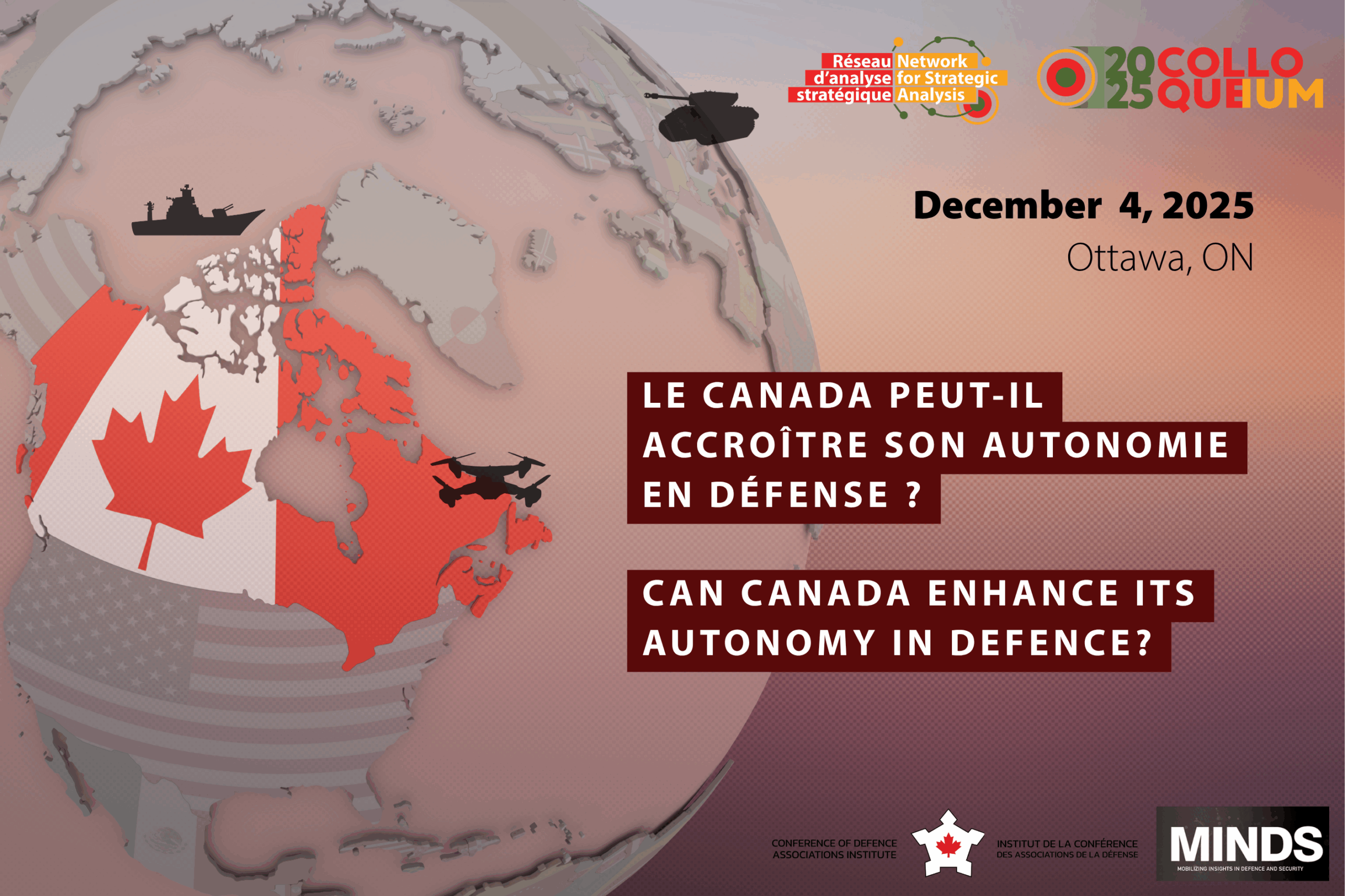The liberal world order is gradually fading, giving way to a more conflictual international environment in which power politics, and technological competition are reshaping strategic balances. China, the United States, and Russia are now pursuing more assertive, often revisionist, foreign policies, while the race for armaments, artificial intelligence supremacy, and access to critical minerals is intensifying great-power rivalries.
In this uncertain and dangerous context, Canada’s sovereignty and security are directly being put to the test. The country is compelled to rethink the foundations of its defence policy to better adapt to these rapid transformations. Amid so much uncertainty, a central question arises: Does Canada have the means to strengthen its defence autonomy?
Four expert panels will address this question from various angles, examining the conditions, constraints, and opportunities for greater Canadian strategic autonomy. The first panel will focus on industrial cooperation and strategic diversification, exploring how Canada can enhance its defence autonomy while maintaining close ties with its allies and diversifying its international partnerships. The second panel will examine the dilemma posed by Canada’s integration into the North American missile defence system, questioning how to reconcile participation in continental security with the preservation of national sovereignty. The third panel will address Canada’s digital autonomy in the face of cyber threats and dependence on foreign tech giants, identifying the conditions required for the emergence of autonomous digital capabilities. Finally, the last panel will consider what a distinctly Canadian approach to deterrence might look like, exploring how Canada can rethink its strategic posture amid rising global tensions.
This event is organized in collaboration with the CDA Institute and supported by the MINDS program.
Program
8:30 | Opening remarks
Jonathan Paquin, Director of the Network for strategic analysis
8:40 – 10:15 | Panel 1: Industrial Cooperation and Strategic Diversification.
Defense autonomy relies on a coherent industrial, technological, and diplomatic ecosystem. However, Canada remains heavily dependent on its allies, particularly the United States, for the supply, research, and production of military equipment. In a context of increased rivalry among major powers, this dependence presents significant strategic challenges. How can Canada strengthen its strategic autonomy, deepen industrial cooperation with certain allies, and diversify its strategic partnerships? This panel will examine the political, institutional, and economic levers available to Canada to consolidate its defense base and increase its strategic flexibility.
Moderator:
- Justin Massie, Codirector of the Network for strategic analysis, full professor, UQAM
- Philippe Lagassé, Associate Professor, Carleton University
- Sarah-Myriam Martin-Brûlé, Codirector of the Network for strategic analysis, Full Professor, Bishop’s University
10:15 – 10:30 | Health Break
10:30 – 12:00 | Panel 2: The anti-missile shield: how to reconcile Canadian autonomy with North American defense integration?
Canada’s possible integration into the North American missile defense system raises a strategic dilemma: how can we participate fully in continental security without relying entirely on the United States for the protection of our territory? President Trump’s “golden dome” project crystallizes the tensions between dependence and autonomy. This panel will discuss Canada’s room for maneuver in this sensitive area and the conditions necessary to ensure that increased participation does not result in a loss of decision-making sovereignty.
Moderator: Steve Saideman Full Professor, Carleton University
- Andrea Charron, Associate Professor, University of Manitoba
- Paul Meyer, Associate Professor, Simon Fraser University
- Gaëlle Rivard Piché, Director of the CDA Institute
12:00 – 13:00 | Lunch
13:00 – 14:30 | Panel 3: Towards a greater Canadian digital autonomy?
In the face of cyber threats, Artificial Intelligence, and dependence on American tech giants, digital autonomy is becoming an essential dimension of our national security. Does Canada have the means to develop sovereign capabilities in cybersecurity, data management, and critical digital infrastructure? This panel will explore the place of digital technology in Canada’s defense strategy and the conditions required for true technological autonomy in an environment dominated by the United States and China.
Moderator: Sarah Sharma, Codirecteur du réseau et professeure adjointe, Université d’Ottawa
- Jean-Christophe Boucher, Associate Professor, University of Calgary
- Stéphanie Carvin, Associate Professor, Carleton University
- Leah West, Associate Professor, Carleton University
14:30 – 14:45 | Health break.
14:45 – 16:15 | Panel 4: How should Canada approach deterrence?
In an international context marked by renewed rivalries between major powers, threats made by Donald Trump, and the modernization of nuclear arsenals, the concept of deterrence has regained significant importance. As a non-nuclear power and NATO ally, Canada must rethink its stance in the face of hybrid, cyber, and conventional threats. What does “deterrence” mean for a country whose strategy is based on the credibility of alliances rather than the possession of strategic weapons? This panel will examine the relevance and possible contours of a “Canadian-style” deterrence, between collective engagement and the assertion of increased strategic autonomy.
Moderator: Daniel Jean, Advisory Board of the Network for Strategic Analysis, Former National Security and Intelligence Advisor to the Prime Minister of Canada
- Emile Lambert-Deslandes, PhD Candidate, Queen’s University
- Eric Ouellet, Full Professor, Canadian Forces College
- Nancy Teeple, Strategic Analysis, Centre for Operational Research and Analysis (CORA)
- Thomas Hughes, Assistant Professor, Mount Allison University
16:15 – 16:30 – Closing remarks





Comments are closed.